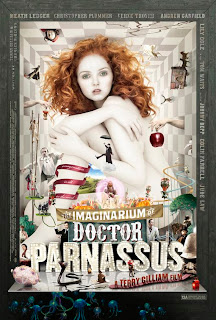
The critics aren’t exactly raving over Terry Gilliam’s latest film, but they’re being kinder to it than his last couple of films, so I guess that’s encouraging. THE IMAGINARIUM OF DOCTOR PARNASSUS, which also happens to be Heath Ledger’s last film, is a bit of a spiritual sequel to THE ADVENTURES OF BARON MUNCHAUSEN, both stories of old age and imagination, only this time smaller and more intimate. It’s sometimes opaque in its storytelling, and like all Gilliam’s work a tad undisciplined, but it’s not just a collection of pretty images; the film explores some fascinating thematic territory and can be seen, in a way, as the filmmaker’s commentary on what he does and what drives him.
Dr. Parnassus (Christopher Plummer) is a millenia-old storyteller, immortal due to a deal with the devil (played by Tom Waits, a victim of typecasting if there ever was one.) His Imaginarium is a rickety traveling stage show, the sort you don’t really see much at all ever, but it has a twist; participants dragged into his “mirror” find themselves inside their own imaginations, confronting their own desires and nightmares. Inevitably the devil shows up to tempt them towards their basic instincts, winning souls when he succeeds, though Parnassus tries to steer them towards the right path. Parnassus does the show with an assistant named Anton (Andrew Garfield), a little person named Percy (Verne Troyer), and his daughter, Valentina (Lily Cole). Valentina is just about to come of age, which presents a problem, since unbeknownst to her, her father promised the devil his child some time ago. However, one night the travelers happen upon and rescue a hanging man (Ledger), who apparently doesn’t remember who he is but is running from something nasty in his past. Parnassus takes it as a sign, and the devil offers another bet- first to claim 5 souls wins, and his daughter’s freedom is at stake. The man, Tony, decides to help out with the show and offers some ideas for its modernization, but his affection for Valentina creates a triangle with Anton, and Valentina herself still doesn’t realize what’s at stake. Making things even messier, the problems that have dogged Tony haven’t gone away at all...
It’s nearly impossible to ignore the reality of Heath Ledger’s tragic death while watching the film, as his passing left several of his character’s scenes unshot. Most of what was left was, apparently, Tony’s journeys into the mirror, and here three actors- Johnny Depp, Jude Law, and Colin Farrel- stepped into the role, one for each journey, with the explanation that Tony’s appearance changes whenever he’s inside. Fortunately the majority of the character’s scenes- all of those in the real world- are Ledger’s, allowing him to establish the bass line. The others don’t imitate him, precisely, but put certain spins on the core character according to each flight of fancy, while the personality remains coherent. Ledger’s work isn’t nearly as show-stealing as it was in THE DARK KNIGHT, but one still can’t help but be struck by his intensity, and I think it’s become clear that he was first and foremost a remarkably versatile performer.
Fantasy sequences are something of a trademark of Gilliam’s (not counting ADVENTURES OF BARON MUNCHAUSEN or TIME BANDITS, where such sequences were effectively the entire picture minus one or two scenes), and his latest visions don’t disappoint. Whether it’s the candy-colored but still dangerous realms of the Imaginarium, or the glimpses of Parnassus’ distant past, the film offers some amazing visuals that are loaded with metaphors and poetic images. The fantasies feel organic, but never random; Gilliam frames each one as a kind of morality play, suggesting that we use art and imagination to define ourselves. Parnassus’s dreamscapes are neutral- he offers salvation, the Devil offers the cheaper and easier pleasures, and it’s ultimately our decision. But it’s possible that my analysis is just throwing my own perception of art/imagination onto Gilliam’s and co-writer Charles McKeown’s, because they don’t hit you over the head with a message. Still, certain passages seem almost autobiographical, reflecting a knowledge of the joys and sacrifices of a life devoted to creating fantasy.
The film definitely has a lopsided feel at times; Gilliam’s work is always a little chaotic, though this is not an entirely bad thing. There could stand to be more characterization, particularly of Valentina, who wants to get away from all this but feels loyal to her father. Some of the finer details of the story could also use explaining; it’s one of those cases where you can understand the thematic intent, but concrete details aren’t worked out. Of course, Ledger’s death may have necessitated that some scenes be discarded rather than recast (and there is something sad in that the character’s last scenes belong to another actor.) Then again, we can’t be sure unless/until a script is released.
But it’s one of those cases where the more you think back to the flaws, the less they matter, and the more the good parts stand out. This is a film rich in mystery and ambiguity, one which seems to compel repeat viewings. I don’t consider this a comeback for Gilliam, because I’m on record as being in TIDELAND’s corner, but that film did represent a sort of experiment on the extreme fringe of filmmaking. THE IMAGINARIUM OF DOCTOR PARNASSUS, while not really mainstream, is more accessible, seductive, and just plain fun. It feels like old times, while exploring some new territory. Don’t just see it because it’s Ledger’s last work; see it because it’s a tribute to anyone who thinks stories are important.
Written by Terry Gilliam and Charles McKeown
Directed by Terry Gilliam
Grade: A-
No comments:
Post a Comment